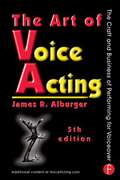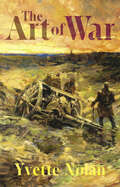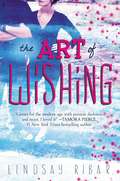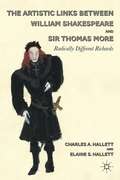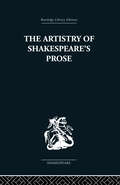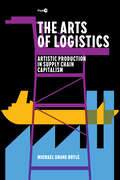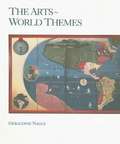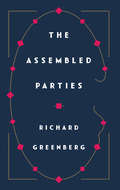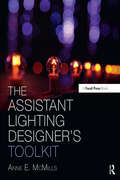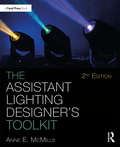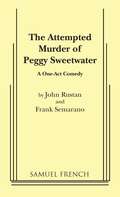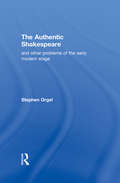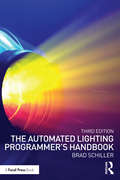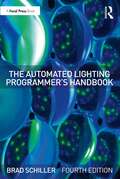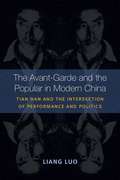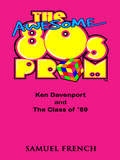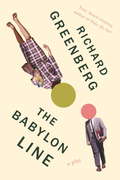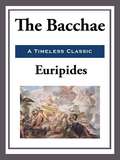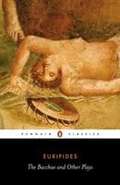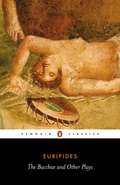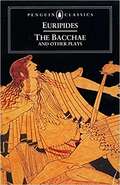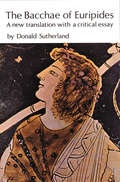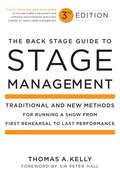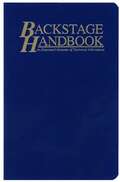- Table View
- List View
The Art of Voice Acting: The Craft and Business of Performing for Voiceover (Fifth Edition)
by James AlburgerFrom basic acting techniques and exercises for keeping the voice in top condition, to marketing and promotion of the actor, The Art of Voice Actingcovers it all. Now in its fifth edition, this essential book is packed with expert advice on job opportunities and career management tips; it is the ideal resource for anyone wanting to maximize their success in the industry. Complete with a companion website and QR codes that link directly to additional material such as audio for every script included in the book, more exercises, and voice relaxation techniques, this is the complete package that gives voiceover actors, and those in related fields, a clear, no-nonsense introduction to the business and art of voice acting. New and updated in this edition: All new scripts and voice exercises More voice and acting techniques Coverage of new trends, including online demos and online auditions Additional coverage of audiobooks and new information on home studio technology All new contributions from some of the top voice talent in the world
The Art of War
by Yvette NolanNick wears a soldier’s uniform but wields only a paintbrush. As an embedded Canadian artist during the Second World War, he is tasked with an impossible mission: to capture the chaos and carnage of battle on canvas. With soldiers, refugees, and showgirls as muses, Nick embarks on a surreal odyssey of self-discovery to understand the purpose and power of his art. What he witnesses—and what he paints—will change him forever and help shape the vision of a young nation.In The Art of War Yvette Nolan offers a poignant meditation on the role of artists in times of war and peace. Finding humour and insight in the challenges of expressing the inexpressible, it is an exaltation of those who steadfastly seek truth amidst great turmoil.
The Art of Wishing
by Lindsay Ribar"[With] a genie like no other. . . this lighthearted book is a well-rounded combination of humor, romance and paranormal suspense, with likable characters and easy-to-believe dialogue. " (Kirkus Reviews) Margo McKenna has a plan of attack for everything, from landing the lead in her high school musical to dealing with her increasingly absent parents. But when she finds herself in possession of a genie's ring and the opportunity to make three wishes, she doesn't know what to do. Especially since Oliver--not blue-skinned, not bottle-dwelling, but a genie nonetheless--can see more than what she's willing to show him. With one peek into her mind, he can see the wishes that even Margo herself doesn't know she wants. But Oliver comes with more than just mind-reading abilities, a flair for magic, and the prettiest eyes Margo's ever seen. Someone from his past is hunting him--someone bent on killing him, along with all the other genies in the world, for the sake of honor. And as Margo soon discovers, it will take more than three wishes to save him. A whole lot more. .
The Artistic Links Between William Shakespeare and Sir Thomas More
by Charles A. Hallett Elaine S. HallettApproaching the subject from a dramaturgical point of view, this investigation differs from anything that has been written about the relationship between Thomas More and William Shakespeare. This book defines, in specific terms, what Shakespeare learned from his study of More's "History"and how he exploited that knowledge to heighten the drama. "
The Artistry of Shakespeare's Prose
by Brian VickersFirst published in 1968. This re-issues the revised edition of 1979. The Artistry of Shakespeare's Prose is the first detailed study of the use of prose in the plays. It begins by defining the different dramatic and emotional functions which Shakespeare gave to prose and verse, and proceeds to analyse the recurrent stylistic devices used in his prose. The general and particular application of prose is then studied through all the plays, in roughly chronological order.
The Arts of Logistics: Artistic Production in Supply Chain Capitalism (Post*45)
by Michael Shane BoyleWe live in a world where nothing is untouched by supply chains—art included. In this major contribution to the study of contemporary culture and supply chains, Michael Shane Boyle has assembled a global inventory of aesthetics since the 1950s that reveals logistics to be a pervasive means of artistic production. The Arts of Logistics provides a new map of supply chain capitalism, scrutinizing how artists retool technologies designed for circulating commodities. What emerges is a magisterial account of the logistics revolution that foregrounds the role played by art in the long downturn of global capitalism. With chapters on art produced from technologies including ships, barrels, containers, and drones, Boyle narrates the long history of art's connection to logistics, beginning in the transatlantic slave trade and continuing today in Silicon Valley's dreams of automation. The global reach of the artists considered reflects the geographies of supply chain capitalism itself. In taking stock of how performance, sculpture, and popular culture are entangled in trade and racialized labor regimes, Boyle profiles influential work by artists such as Christo and Allan Kaprow alongside that of contemporary figures including Cai Guo-Qiang and Selina Thompson. This incisive study demonstrates that art and logistics are linked by the infrastructures and violence that keep supply chains moving.
The Arts: World Themes
by Geraldine NagleA fresh approach to the interdisciplinary humanities course that takes a strong multicultural approach to the visual and performing arts. Organized thematically, the text covers painting, printmaking, sculpture, camera arts, architecture, music, and drama.
The Assembled Parties
by Richard Greenberg"The Assembled Parties is Greenberg's most richly emotional work in years, and the most beautifully detailed."--New York magazine"This tragicomedy shocks us into realizing how hungry we have been for witty and wounded grown-ups who toss off gorgeously written observations without knowing how little we know about what we think we know."--NewsdayMeet the Bascovs, an Upper West Side Jewish family in 1980. In an opulent apartment overlooking Central Park, former movie star Julie and her sister-in-law Faye bring their families together for a traditional holiday dinner on a night when things don't go as planned. Twenty years later, as 2001 approaches, the Bascovs's seemingly picture-perfect life may be about to crumble. An incisive portrait of a family grasping for stability at the dawn of a new millennium, The Assembled Parities premiered on Broadway in 2013 to rave reviews and a Tony Award nomination for Best Play.Richard Greenberg has written two dozen plays in his thirty-year career, including Take Me Out (Tony Award for Best Play, Drama Desk Award, NY Drama Critics Circle Award, Outer Critics Circle Award, Lucille Lortel Award), The Dazzle (Outer Critics Circle Award), Three Days of Rain (L.A. Drama Critics Award, Pulitzer Prize finalist), The American Plan, the book for a musical adaptation of Far From Heaven, and many more. He has received the Oppenheimer Award for a new playwright as well as the first PEN/Laura Pels Award for a playwright in mid-career.
The Assistant Lighting Designer's Toolkit (The Focal Press Toolkit Series)
by Anne E. McMillsWhat are the do’s and don’ts of being a good assistant lighting designer? What are focus tapes, and how do I use them? What is the best method for creating a magic sheet? What should be found in every assistant’s kit? How do I make that first important leap into this professional career? Answer these questions and many more with The Assistant Lighting Designer’s Toolkit. This definitive guide unlocks the insider-secrets used to succeed as a professional assistant lighting designer (ALD) – whether choosing assisting as a career or while transitioning to another. This book outlines, step-by-step, the challenges the ALD faces during every phase of production. Never before has a resource existed that views the design process through the eyes of the assistant. Intermingled among the nuts and bolts of the paperwork and essential procedures, top industry professionals reveal tips for personal survival in this challenging career – both domestically and abroad as well as in other careers in lighting. Within these pages are the industry secrets rarely taught in school! The author's website can be found at http://www.aldtoolkit.com/.
The Assistant Lighting Designer's Toolkit (The Focal Press Toolkit Series)
by Anne E. McMillsThe ground-breaking text that took the lighting world by storm returns in its second edition, unlocking the insider secrets and proven, time-tested methods to succeed as a professional assistant lighting designer. This definitive guide outlines, step-by-step, the daily challenges that assistant lighting designers face during every phase of production, and the solutions for overcoming them. Furthermore, intermingled among the highly detailed paperwork techniques and essential procedures, top industry professionals reveal tips for success in this challenging career. This fully updated second edition features: All new advice, real-world stories, and current paperwork examples from over 120 working professionals. Updated industry practices with case studies from the professionals themselves, such as how to create a video network to record previews for the lighting department; how much printing is done in an increasingly paperless world; how to produce a set electrics package; and how the industry interfaces with cutting-edge technology like remote followspots and pre-visualization software. New lifestyle tips for traveling abroad, negotiating contracts, and dealing with stressful situations. The Assistant Lighting Designer's Toolkit, the most trusted authority on assisting in the lighting world, equips budding assistant lighting designers and students studying lighting design with the insider knowledge they need to achieve the successful career that they have always wanted—whether choosing assisting as a career or as a stepping-stone toward design. Within these pages are the industry secrets rarely taught in school!
The Attempted Murder of Peggy Sweetware: A One-act Comedy
by John RustanFarce, 7m, 4f; 1930's. In this light hearted tale of attempted murder on a banana plantation in South America. in the British potboiler a la Monte Python style, three bumbling upper class twits attempt to solve a gaggle of murder attempts. "Illegitimate triplets, poisoned crumpets, unregistered Liberian freighters and ancient Siamese bone china all work themselves into the silliest of funny plots."-- Pacesetter/Highlander. "A double barreled blast of pure nonsensical comedy."-- L.A. Times.
The Authentic Shakespeare: and Other Problems of the Early Modern Stage
by Stephen OrgelFirst published in 2003. Routledge is an imprint of Taylor & Francis, an informa company.
The Automated Lighting Programmer's Handbook
by Brad SchillerThis guide helps lighting designers with the creative and operational challenges they face in their rapidly evolving industry. Providing respected and clear coverage of the process of programming automated lighting fixtures, the author brings the designer from basic principles to preproduction preparations. Concepts, procedures, and guidelines to ensure a successful production are covered as well as troubleshooting, much needed information on work relationships, and technology including LED lighting, console networking, digital lighting, and more. Chapters are peppered with advice and war stories from some of the most prominent lighting designers of today.
The Automated Lighting Programmer's Handbook
by Brad SchillerThe Automated Lighting Programmer’s Handbook, fourth edition, provides respected and clear coverage of the process of programming automated lighting fixtures from basic principles to advanced production preparations. This guide helps lighting programmers and designers with the creative and operational challenges they face in their rapidly evolving industry. Concepts, procedures, and guidelines to ensure a successful production are covered as well as troubleshooting, much needed information on workflows, technology, work relationships, console networking, digital lighting, and more. Chapters are peppered with advice and war stories from some of the most prominent lighting designers and programmers of today. The fourth edition is the most comprehensive yet: added topics include programming structure, advanced recording/editing, cloning, multi-cell fixtures, safety routines, GDTF, and pre-visualization. Deep explorations into the work of programmers from Earlybird and Broadway provide readers with timely real-world scenarios and advice. The information in this book is perfect for anyone interested in the programming of automated lighting in any market. From the beginner to the expert, the methodologies within provide simple, yet powerful tools to assist with any production. Lighting designers also will gain important knowledge about the procedures and concepts utilized by lighting programmers.
The Avant-garde And The Popular In Modern China: Tian Han And The Intersection Of Performance And Politics
by Liang LuoThe Avant-Garde and the Popular in Modern China explores how an important group of Chinese performing artists invested in politics and the pursuit of the avant-garde came to terms with different ways of being "popular" in modern times. In particular, playwright and activist Tian Han (1898-1968) exemplified the instability of conventional delineations between the avant-garde, popular culture, and political propaganda. Liang Luo traces Tian's trajectory through key moments in the evolution of twentieth-century Chinese national culture, from the Christian socialist cosmopolitanism of post-WWI Tokyo to the urban modernism of Shanghai in 1920s and 30s, then into the Chinese hinterland during the late 1930s and 40s, and finally to the Communist Beijing of the 1950s, revealing the dynamic interplay of art and politics throughout this period. Understanding Tian in his time sheds light upon a new generation of contemporary Chinese avant-gardists (Ai Wei Wei being the best known), who, half a century later, are similarly engaging national politics and popular culture.
The Awesome 80's Prom
by Ken Davenport11m, 8f / Comedy, Audience Participation/Interactive / Unit Set The Awesome 80s Prom is a brand new blast-from-the-past party in the style of Tony 'n Tina's Wedding and The Donkey Show set at Wanaget High's Senior Prom... in 1989! All your favorite characters from your favorite '80s movies are at THE PROM, from the Captain of the Football Team to the Asian Exchange Student, from the Geek to the hottie Head Cheerleader, and they're all competing for Prom King and Queen. And just like on "American Idol", the audience decides who wins! Come back in time and join the breakdance circle or just sit back and watch the '80s drama unfold. WINNER! 2006 IMPROV THEATER AWARD - "BEST INTERACTIVE SHOW"
The Axe
by Antonio Morcillo LopezTwo peculiar mechanics in any garage of any town in Spain discover, in the car they are trying to fix, something that will change their humdrum lives and that will get out their darker side. Violence is increasingly present in our daily lives, in our workplace, in our relationships and especially in the media. Gradually serious events like a terrorist attack are becoming in our daily bread, which makes us more increasingly insensitive to them. The play aims to be a mirror in which the spectator looks and recognizes that dark side that none of us are willing to see: Really you would not be able to kill someone? Are we all so civil as not to cross the line that would make us terrorists? How much blame the media have all these? To what extent are we able to exercise this violence on ourselves?.
The Babylon Line
by Richard GreenbergAn electrifying new play by Tony Award-winning playwright Richard Greenberg, The Babylon Line opens at Lincoln Center Theater on December 5, 2016. A thirty-eight-year-old writer from Greenwich Village, Aaron is painfully aware of his failures as an artist when his desperate need for a job forces him to commute along the Babylon Line to Levittown to teach. What awaits him is a classroom of varyingly unwilling students, some who attend because their preferred course was full, others who are attentive enough but sit silently at their desks--and all of whom have yet to set pen to paper. Over the course of the semester, Aaron's adult pupils write increasingly more honest life accounts and stories, and cracks begin to appear in their small-town community. A particularly bold and troubled student, Joan, strikes up a rapport with Aaron that threatens to become something more, as the pair bond over their failing marriages and creative frustrations. In the end, we observe the life-changing effects of artistic expression as Greenberg maps out the rest of each of the characters' lives, full of triumphs and newfound joy that can be traced back directly to those few weeks in a classroom in 1967. Richard Greenberg's intelligent, nuanced, and perceptive dialogue has been described by the New York Times as "exquisite . . . sparkling gems that [he] delivers with gratifying frequency." One of America's most loved and frequently produced playwrights, Greenberg has wisdom that runs deep, and his humor and charm make his work destined to be read and performed for generations to come.From the Trade Paperback edition.
The Bacchae
by EuripidesClassic Greek tragedy concerns the catastrophe that ensues when the King of Thebes imprisons Dionysus and attempts to suppress his cult. Full of striking scenes, frenzied emotion, and choral songs of great power and beauty, the play is a fine example of Euripides' ability to exploit Greek myth to probe human psychology.
The Bacchae and Other Plays
by EuripidesThrough their sheer range, daring innovation, flawed but eloquent characters and intriguing plots, the plays of Euripides have shocked and stimulated audiences since the fifth century BC. <p><p> Phoenician Women portrays the rival sons of King Oedipus and their mother's doomed attempts at reconciliation, while Orestes shows a son ravaged with guilt after the vengeful murder of his mother. <p><p> In the Bacchae, a king mistreats a newcomer to his land, little knowing that he is the god Dionysus disguised as a mortal, while in Iphigenia at Aulis, the Greek leaders take the horrific decision to sacrifice a princess to gain favour from the gods in their mission to Troy. <p><p> Finally, the Rhesus depicts a world of espionage between the warring Greek and Trojan camps.
The Bacchae and Other Plays
by EuripidesThrough their sheer range, daring innovation, flawed but eloquent characters and intriguing plots, the plays of Euripides have shocked and stimulated audiences since the fifth century BC. Phoenician Women portrays the rival sons of King Oedipus and their mother's doomed attempts at reconciliation, while Orestes shows a son ravaged with guilt after the vengeful murder of his mother. In the Bacchae, a king mistreats a newcomer to his land, little knowing that he is the god Dionysus disguised as a mortal, while in Iphigenia at Aulis, the Greek leaders take the horrific decision to sacrifice a princess to gain favour from the gods in their mission to Troy. Finally, the Rhesus depicts a world of espionage between the warring Greek and Trojan camps.
The Bacchae and Other Plays: Ion the Women of Troy Helen the Bacchae
by Philip VellacottThe plays of Euripides have stimulated audiences since the fifth century BC. This volume, containing Phoenician Women, Bacchae, Iphigenia at Aulis, Orestes, and Rhesus.
The Bacchae of Euripides: A New Translation with a Critical Essay
by Euripides Donald SutherlandThis new translation of The Bacchae—that strange blend of Aeschylean grandeur and Euripidean finesse—is an attempt to reproduce for the American stage the play as it most probably was when new and unmutilated in 406 B.C. The achievement of this aim involves a restoration of the "great lacuna" at the climax and the discovery of several primary stage effects very likely intended by Euripides. These effects and controversial questions of the composition and stylistics are discussed in the notes and the accompanying essay.
The Back Stage Guide to Stage Management, 3rd Edition
by Thomas A. KellyThe Most Widely Used Manual For Aspiring And Veteran Stage Managers - Now Revised and ExpandedThe next best thing to shadowing a Broadway stage manager, this detailed, behind-the-scenes book as been brought completely up to date. First published in 1991, it is widely used and has been lauded as the most comprehensive, educational book on stage management available. From preproduction planning and first rehersals to opening night and final strike, all the essentials of the profession are presented here in a friendly, engaging style.Blending how-to information with anecdotes from his own career, author Thomas A. Kelly explains the entire theatrical process, including:- Organizing all rehearsals and performances- Maintaining the working script, cue sheets, and daily records- Supervising the technical aspects of the show- Running shows outdoors and at other non-theatrical venues- Dealing with performers and crew members on all levelsThis new edition reflects all the latest developments and innovations in the industry and adds a totally new chapter on opera stage management, complete with an in-depth breakdown of the challenges this style of production presents. The text is supported by sample documents, diagrams, and charts that straddle time-honored approaches with what can be generated by today's computer software. All the latest stage machinery is discussed, along with tips on finding employment. This guide remians the first choice for anyone who works in any branch of the profession, whether amateur, educational, or professional.From the Trade Paperback edition.
The Backstage Handbook: An Illustrated Almanac of Technical Information
by Paul Carter George ChiangFirst published in 1988, Backstage Handbook is one of the most widely used stagecraft textbooks in the United States, with about 10,000 copies sold every year. <p><p> This handy reference book brings together under one cover an incredible variety of information useful to designers, technicians and students who work behind the scenes in theatre, film and television. Its sturdy leatherette binding will stand up to years of constant use. <p><p> The third edition updates this popular reference book with new terminology and materials, and adds dozens of new illustrations of grip hardware, film lighting equipment and painting tools. Backstage Handbook includes chapters on Tools, Hardware, Materials, Electrics, Shop Math, Architecture and Theatre. There are hundreds of illustrations, tables and charts which cover everything from the stock sizes and specs of wood screws, to safe working loads for several kinds of rope, to illustrations of twenty-two types of standard lamp bases.
